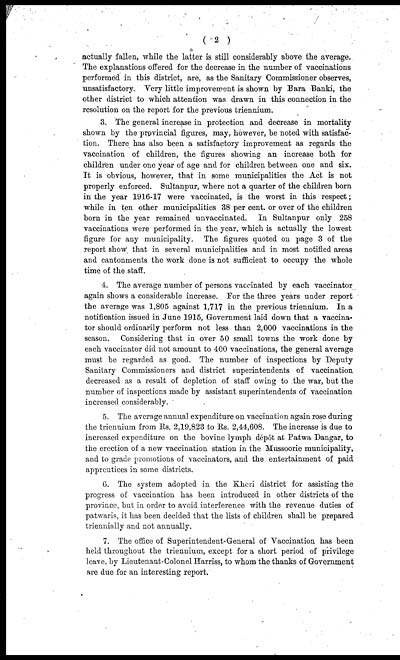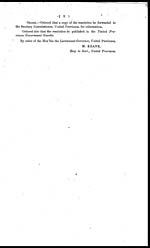Medicine - Vaccination > 1902-1928 - Report on vaccination in the United Provinces > Vaccination United Provinces of Agra and Oudh 1914-1922 > 1914-1917 - Triennial report on vaccination in the United Provinces of Agra and Oudh for the years 1914-15, 1915-16 and 1916-17
(182) Page 2
Download files
Individual page:
Thumbnail gallery: Grid view | List view

( 2 )
actually fallen, while the latter is still considerably above the average.
The explanations offered for the decrease in the number of vaccinations
performed in this district, are, as the Sanitary Commissioner observes,
unsatisfactory. Very little improvement is shown by Bara Banki, the
other district to which attention was drawn in this connection in the
resolution on the report for the previous triennium.
3. The general increase in protection and decrease in mortality
shown by the provincial figures, may, however, be noted with satisfac-
tion. There has also been a satisfactory improvement as regards the
vaccination of children, the figures showing an increase both for
children under one year of age and for children between one and six.
It is obvious, however, that in some municipalities the Act is not
properly enforced. Sultanpur, where not a quarter of the children born
in the year 1916-17 were vaccinated, is the worst in this respect;
while in ten other municipalities 38 per cent. or over of the children
born in the year remained unvaccinated. In Sultanpur only 258
vaccinations were performed in the year, which is actually the lowest
figure for any municipality. The figures quoted on page 3 of the
report show that in several municipalities and in most notified areas
and cantonments the work done is not sufficient to occupy the whole
time of the staff.
4. The average number of persons vaccinated by each vaccinator
again shows a considerable increase. For the three years under report
the average was 1,805 against 1,717 in the previous triennium. In a
notification issued in June 1915, Government laid down that a vaccina-
tor should ordinarily perform not less than 2,000 vaccinations in the
season. Considering that in over 50 small towns the work done by
each vaccinator did not amount to 400 vaccinations, the general average
must be regarded as good. The number of inspections by Deputy
Sanitary Commissioners and district superintendents of vaccination
decreased as a result of depletion of staff owing to the war, but the
number of inspections made by assistant superintendents of vaccination
increased considerably.
5. The average annual expenditure on vaccination again rose during
the triennium from Rs. 2,19,823 to Rs. 2,44,608. The increase is due to
increased expenditure on the bovine lymph dépôt at Patwa Dangar, to
the erection of a new vaccination station in the Mussoorie municipality,
and to grade promotions of vaccinators, and the entertainment of paid
apprentices in some districts.
6. The system adopted in the Kheri district for assisting the
progress of vaccination has been introduced in other districts of the
province, but in order to avoid interference with the revenue duties of
patwaris, it has been decided that the lists of children shall be prepared
triennially and not annually.
7. The office of Superintendent-General of Vaccination has been
held throughout the triennium, except for a short period of privilege
leave, by Lieutenant-Colonel Harriss, to whom the thanks of Government
are due for an interesting report.
Set display mode to: Large image | Zoom image | Transcription
Images and transcriptions on this page, including medium image downloads, may be used under the Creative Commons Attribution 4.0 International Licence unless otherwise stated. ![]()
| Permanent URL | https://digital.nls.uk/90473280 |
|---|
| Attribution and copyright: |
|
|---|



![[Page 1]](https://deriv.nls.uk/dcn4/9047/90473279.4.jpg)
